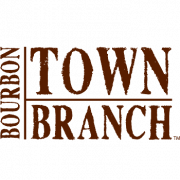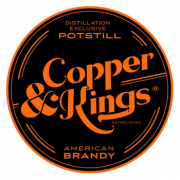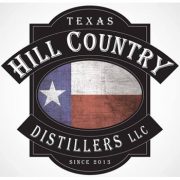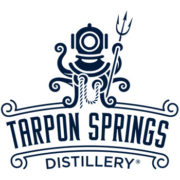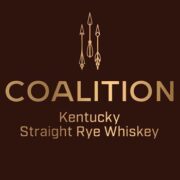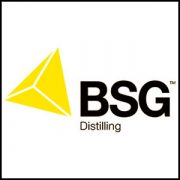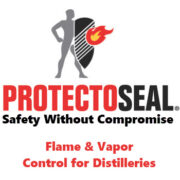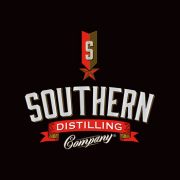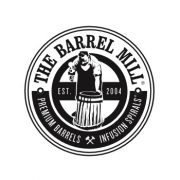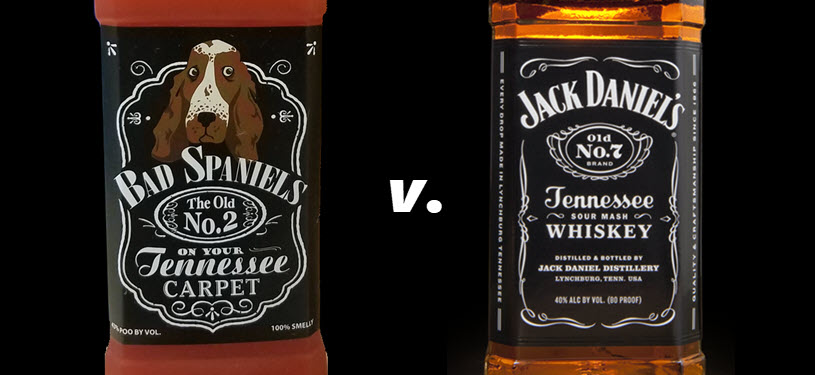
It appears Silly Squeakers Toys has really stepped in the No. 2 again. VIP Products, the makers of Silly Squeakers makes a variety of dog toys that have an uncanny resemblance to many alcohol brands. VIP Products may think it is silly but the owners of many of these famous distilled spirits and beer brands and a group of six industry associations don’t think it is funny at all. In fact, they think it just plain stinks.
In a brief filed for the American Craft Spirits Association – ACSA, American Distilled Spirits Alliance – ADSA (DBA: The Presidents’ Forum of the Distillery Spirits Industry – PFDSI), The Beer Institute, The Brewers Association, Distilled Spirits Council of the United States – DISCUS, and Wine Institute as Amici Curiae in support of petitioner.
QUESTION PRESENTED
1. Whether humorous use of another’s trademark as one’s own on a commercial product is subject to the Lanham Act’s traditional likelihood-of-confusion analysis, or instead receives heightened First Amendment protection from trademark-infringement claims.
2. Whether humorous use of another’s mark as one’s own on a commercial product is “noncommercial” under 15 U.S.C. § 1125(c)(3)(C), thus barring as a matter of law a claim of dilution by tarnishment under the Trademark Dilution Revision Act.
The primary example in this Amicus Brief centers around whiskey brand Jack Daniels Tennessee Whiskey, Old No. 7 and squeaky toy Bad Spaniels, The Old No. 2. The manufacture of the squeaky toy claims its all done in good humor and does not infringe on the Jack Daniels brand name. They clearly know there is a problem as it is spelled out on the toys label with these words.
“The product and its design belong to VIP Products. This product is not affiliated with Jack Daniel Distillery.” Ah yeah, I don’t think so.
The case centers around trademark infringement and responsible advertising of alcohol beverages being used to market to children.
Let’s look at the labels and see how far they take the ‘parody’.
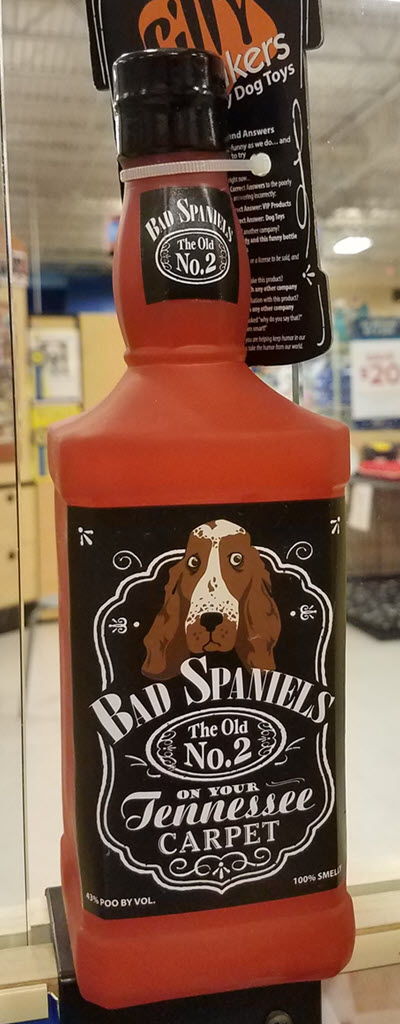
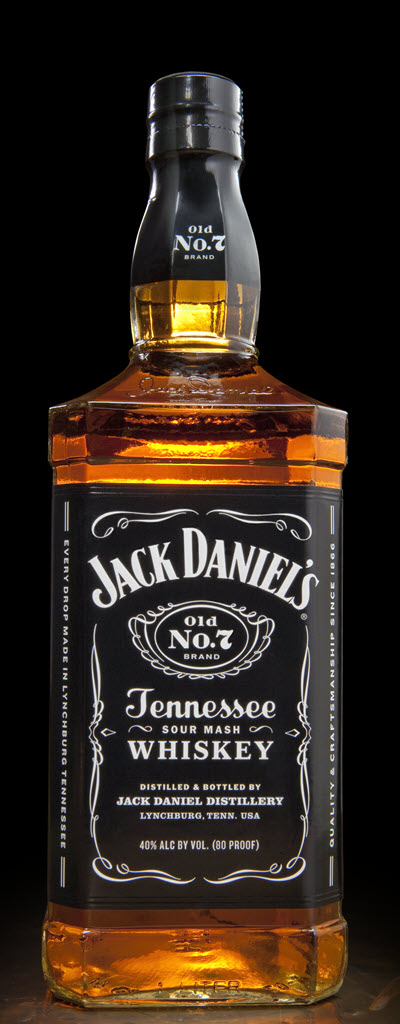
40% ALC BY VOL
| Company Name | Jack Daniel’s Distillery | VIP Squeaky Toys |
|---|---|---|
| Product/Brand Name | Jack Daniel | Bad Spaniel |
| Feature | Old No. 7 Tennessee Sour Mash Whiskey | Old No. 2 On Your Tennessee Carpet |
| Alcohol by Volume | 40% ALC BY VOL | 43% POO BY VOL |
| Proof | 80 PROOF | 100% SMELLY |
| Bottle Shape/Color | Whiskey Bottle/Amber | Whiskey Bottle/Amber |
| Label | Black & White | Black & White |
Stay Informed: Sign up here for the Distillery Trail free email newsletter and be the first to get all the latest news, trends, job listings and events in your inbox.
“We are pleased that the Supreme Court has decided to hear this case. The alcohol beverage industry has long worked to ensure that our products are advertised in a responsible manner and trademark infringers can severely jeopardize these efforts,” said Courtney Armour, DISCUS Chief Legal Officer.

“The 9th Circuit opinion threatens to undermine our commitment to responsibility by inviting trademark infringers to pirate famous alcohol beverage brands so long as they add a humorous twist. This case involves dog toys, but it does not take much imagination to see how this could lead to ‘humorous’ products that encourage binge drinking and blacking out, underage drinking, or drunk driving. The industry must have control over their trademarks for responsible advertising initiatives to succeed.”
The full “JACK DANIEL’S PROPERTIES, INC., PETITIONER v. VIP PRODUCTS LLC” brief can be viewed and downloaded below.
In 2018, a District Court judge ruled in Jack Daniel’s favor and enjoined VIP Products from selling their “Bad Spaniel’s Old No. 2 on your Tennessee Carpet” dog toy. The District Court found a likelihood that the infringing product would result in consumer confusion and that VIP’s use of juvenile bathroom humor would tarnish the Jack Daniel’s brand.
In 2020, however, the U.S. Court of Appeals for the 9th Circuit held that the dog toys were “expressive works” entitled to First Amendment protection and the use of a “humorous message” rendered the product “noncommercial” for trademark dilution purposes. The Supreme Court did not elect to take up the case at that time and the case was remanded to the lower courts, where it once again wound its way back up through the system and is now ripe for the Court to review.
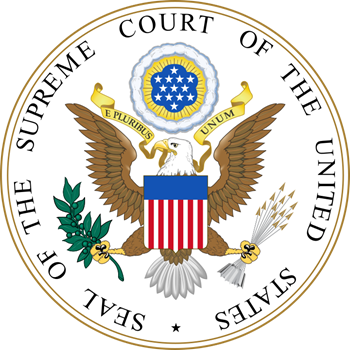
In urging the Supreme Court to grant the petition for certiorari and reverse the decision, the industry groups made the case in their amicus brief that the 9th Circuit’s decision “creates a legally unjustified problem of national scope for the entire alcohol beverage industry.”
The brief stated, “[t]he alcohol beverage industry has invested extensive resources in combatting irresponsible alcohol use. A vital part of the industry’s work is self-regulation carefully crafted to ensure that all advertising that uses trademarks associated with alcohol beverages promotes responsible adult consumption—and never improperly appeals to minors.”
The brief explained that the 9th Circuit’s holdings “opens the door to a host of supposedly humorous infringements of famous marks associated with alcohol beverages,” and “would appear to protect infringing activity that takes the form of jokes about underage drinking, excessive consumption, or drunk driving. From children’s toys to drinking game kits to automobile accessories, those making infringing products need only employ humor to escape liability for trademark infringement or dilution.”
The group underscored in the brief the beverage alcohol industry’s longstanding commitment to responsible advertising and effective self-regulation through their respective voluntary advertising and marketing codes and code review boards.
“These boards have successfully promoted compliance with the industry codes within the industry, on pain of being expelled from the association,” the brief stated. “But the boards have no ability to address irresponsible use of industry participants’ trademarks and trade dress by those outside the industry, whose marketing is not subject to industry rules. . . . If non-industry participants can infringe members’ marks in a manner that promotes irresponsible drinking, that loss of control directly undermines the industry’s self-regulation. In short, policing such misconduct requires rigorous trademark enforcement and robust legal protection of members’ marks.”
“To be sure, everyone likes a good joke,” said Jack Daniel’s lead attorney Lisa Blatt. “But VIP’s profit-motivated ‘joke’ confuses consumers by taking advantage of Jack Daniel’s hard-earned goodwill,” she wrote for the Louisville, Kentucky-based Brown-Forman Corp., Jack Daniel’s parent company.
The amicus brief was filed by the Distilled Spirits Council of the United States, Beer Institute, Brewers Association, American Distilled Spirits Alliance, American Craft Spirits Association and Wine Institute.
Silly Squeakers Dog Toys Promotional Video
What is an Amicus Brief / amicus curiae?
Amicus Curiae literally translated from Latin is “friend of the court.” Plural is “amici curiae.”
Generally, it is referencing a person or group who is not a party to an action, but has a strong interest in the matter. This person or group will petition the court for permission to submit a brief in the action intending to influence the court’s decision. Such briefs are called “amicus briefs.”
Source: Legal Information Institute
Please help to support Distillery Trail. Sign up for our Newsletter, like us on Facebook and follow us on Instagram and Twitter.

